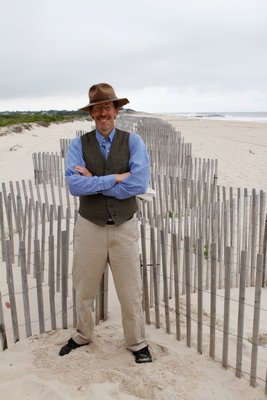
When Geoff Gehman was a kid in the late 1960s, he considered the South Fork—home to potato farmers and a rare celebrity or two—his kingdom.So off the beaten path were the Hamptons, Truman Capote called the area “Kansas with a sea-breeze,” according to Mr. Gehman's new memoir “The Kingdom of the Kid: Growing Up in the Long-Lost Hamptons.”
Whether he was cruising the streets of Wainscott on a bicycle or playing basketball with friends underneath the only streetlamp south of Montauk Highway, Mr. Gehman was at peace in his surrogate hometown. Mr. Gehman has such vivid memories of the places he grew up, he was able to write a memoir without ever keeping any sort of childhood journal. He simply consulted old friends, sought out old haunts and sifted through library and newspaper archives to fill in the blanks.
“Kingdom of the Kid” details the lives of everyone from the literary legend of Mr. Capote to Bridgehampton baseball hero Carl Yastrzemski; from longtime (and current) East Hampton reporter Jack Graves to the owners of the famous Water Mill Penny Candy Shop, Harvey and June Morris; and Mr. Gehman’s own schmoozing and boozing father, Larry. All of these characters either directly or tangentially had an effect on Mr. Gehman, who later spent 25 years as an arts writer for The Morning Call, a newspaper in Allentown, Pennsylvania.
The memoir documents long-gone places, such as the Hamptons Drive-In, where the author reluctantly saw “2001: A Space Odyssey”; the Bridgehampton Race Circuit, where Mario Andretti taught Paul Newman what it meant to really drive; and the Wainscott General Store, where proprietor Chauncey Osborn helped you “pick up your mail, have a window installed in your pickup, [and] get your boat caulked.”
But the good times were not meant to last. Mr. Gehman’s father abruptly sold the family home without his mother, Patricia’s, permission in 1972 and six years of bliss here on the East End ended.
From 1972 to 1991, the author would set foot on the South Fork only when he would occasionally visit his father, who split with his mother not long after the family moved back to New Rochelle in Westchester county. After his father suffered a stroke, Gehman moved him from Hampton Bays to his own residence in Bethlehem, Pennsylvania, and discontinued his trips out east.
It took 10 more years and writing a memoir for him to return to his beloved South Fork.
“I had this feeling I wouldn’t be getting back to the South Fork for a while. I knew these people were important, but I didn’t know why,” Mr. Gehman said during a recent telephone interview. “Writing this book was my Throgs Neck Bridge, my way back to the island and the people who helped me grow into who I am.”
Today, he laments how “the wealthy made it their playground, their fiefdom. And that isn’t a concern only to Mr. Gehman, he said. In his book, he quotes Harold Becker, owner of the Norman Jaffe-designed Becker House in Wainscott, on why he sold the famous residence.
“I’ll regret selling it to my dying day. But that’s an abstract regret. The truth is, I lost heart in the whole area when all the nouveau riche came in with all those self-referential monstrosities that they put up to say: Hey, look at me. The locusts came and ate everything in sight,” Mr. Becker is quoted in the book.
Mike Raffel, an old neighborhood friend still in touch with Mr. Gehman, moved off the South Fork in 2003.
“The city people took the country out of the country,” he told the author.
Mr. Gehman said he also gets upset by the media focus solely on the Hamptonite high-life, marginalizing the everyday people who make the South Fork run.
“I found myself arguing with writers from The New York Times and New York Magazine, who reduce the East End to a playpen for spoiled brats obsessed with getting the right raspberries, the right area code and permits to the right beaches,” the author explained. “I [can’t] stand that through the media, the Hamptons [became] Hollywood East to the rest of the country. Glitzy, greedy, nasty.”
But more than anything, Mr. Gehman enjoys reliving the six years he spent in a “special place at a special time that taught a kid how to be special.”
The memoir, which was published this month, took approximately 60 interviews and 20 years’ worth of free time to research and complete. Mr. Gehman says he was compelled to write it for two reasons.
First, was to “pay tribute to the folks who really made my childhood special.” Second was in order to bring peace to his family.
“I wrote it to give my mother and sister[Meg] pleasant memories about an often painful time,” he said.
In a sense, the author’s father also found peace through the memoir. Mr. Gehman spread his ashes around Wainscott upon completion of the manuscript.
Geoff Gehman will be speak about “The Kingdom of the Kid: Growing Up in the Long-Lost Hamptons” at the Hayground School Farmers Market in Bridgehampton on Friday, July 12; at Canio’s bookstore in Sag Harbor on Saturday, July 13; at the Bridgehampton Historical Society on Sunday, July 14; and at the Hampton Bays Public Library on September 8.